Alan Spence
Singing Lucifer and Other New Poetry
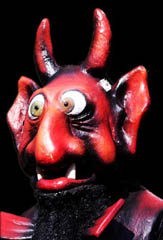 Once poets are established and have published their sixth or seventh or ninth collection, you generally know what to expect from them. This is not a prejudice, more a general observation. So it is always refreshing to come across work by a new writer; singing lucifer is Paula Jennings’ first collection, and her poems are impressive and memorable. Her work is concerned with identity and relationships, and Jennings writes with a fine turn of mind and finer turn of phrase about closely observed aspects of love and life, celebrations of sexual love and family love. Jennings also writes poignantly about loss, that awful common denominator: she bravely answers death with song, even though ‘death holds my ankles as I walk.’ Jennings has a particularly engaging poetic voice. I look forward to her next collection.
Once poets are established and have published their sixth or seventh or ninth collection, you generally know what to expect from them. This is not a prejudice, more a general observation. So it is always refreshing to come across work by a new writer; singing lucifer is Paula Jennings’ first collection, and her poems are impressive and memorable. Her work is concerned with identity and relationships, and Jennings writes with a fine turn of mind and finer turn of phrase about closely observed aspects of love and life, celebrations of sexual love and family love. Jennings also writes poignantly about loss, that awful common denominator: she bravely answers death with song, even though ‘death holds my ankles as I walk.’ Jennings has a particularly engaging poetic voice. I look forward to her next collection.
As it says on the tin, Fras is as an occasional literary journal with wide cultural sympathies which provides an outlet for work of quality in Scots, Gaelic and English (and is available at the cover price of £4 from Atholl Browse Bookshop by The Station, Blair Atholl, Perthshire, Scotland PH18 5SG). The second number of Fras opens with a provocative piece by Hugh Learmont, entitled ‘Kenneth White and the Awkward Squad: a dialogue’. It also features poetry in French and translations from Russian prose, and a curious poem by Robin Bell about Cinderella and the philological mishap that befell her when Perrault first collected her story from folklore. (‘Vair’ is ermine; ‘verre’, glass). In the short editorial, pithily entitled ‘A Wee Note’, the editors lament ‘the post-devolution posturing resurgence of the ”Little Scotland” mentality’ and urge us to be more outward-looking, and to ‘place Scotland and its literature once more within a European context, and beyond that a wider one.’ This same cry was made by C.M. Grieve, aka Hugh MacDiarmid (as well as by many others too) more than eighty years ago. It fell on largely unhearing ears then, though some did take up the cause. The struggle, however, continues. Exceptionally, Walter Perrie, one of the editors of Fras, includes in this number a flyting of his own, the target of this attack being the great poet Tom Scott. Though it was composed during Scott’s lifetime, Sorley Maclean felt this particular flyting should be repressed. Maclean and Scott are now at ‘where extremes meet’, and Perrie evidently no longer feels ‘any prohibition’ from publishing his poem. Stringent in its form, which is ‘integral to the intensity of its purpose’, Perrie’s ‘Flyting’ consists of six acrostical stanzas and is handled with some technical skill. But ‘de mortuis nisi bonuum’.
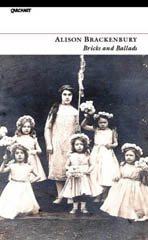 In Bricks and Ballads, her sixth volume, Alison Brackenbury demonstrates the fine art of a kind of ‘bel canto’. As a lyrical poet, her work truly does sing, and it sings best of all amidst the uncertainty. Not that Brackenbury is a poet who dwells on the hopelessness of life or feeds on pessimism. Hers is a sympathetic imagination and she is a poet whose work is informed by her relationship with her world, all the good, and the bad and the ugly. Brackenbury’s work can be witty, clever, or sardonic, as in ‘Epigrams’, where her Latin has left her, ‘which may be as well./They were brute engineers/and their afterlife, hell.’ She complains about being ‘weighed down by parents,/made mad by my child./The late sky is sleeting,/the garden is wild.’ The key to it all is the sole Latin tag she can recall, ‘I slump on the chair/in the last glow day brings./In media res/in the muddle of things.’ And in the imagined half-world of ‘After the Rats’, the speaker tells us, ‘I married the piper./It was not brave…’ But beds made have to be laid on, ‘Does he swoop me to sleep?/Do I float through my days/As fish slip unmoving/Through blue and green haze?/ None of this. I survive./My four children stretch tall;/But the piper grows grey/And my pension is small./We do not wake all day,/Sleep the whole night./I sing on frost’s doorstep./My voice thins to light.’ ‘Late Again’, which closes the collection, is a poem which apostrophises Time and gently, so gently reminds us that, do what it will to us, ‘Time too will end.’
In Bricks and Ballads, her sixth volume, Alison Brackenbury demonstrates the fine art of a kind of ‘bel canto’. As a lyrical poet, her work truly does sing, and it sings best of all amidst the uncertainty. Not that Brackenbury is a poet who dwells on the hopelessness of life or feeds on pessimism. Hers is a sympathetic imagination and she is a poet whose work is informed by her relationship with her world, all the good, and the bad and the ugly. Brackenbury’s work can be witty, clever, or sardonic, as in ‘Epigrams’, where her Latin has left her, ‘which may be as well./They were brute engineers/and their afterlife, hell.’ She complains about being ‘weighed down by parents,/made mad by my child./The late sky is sleeting,/the garden is wild.’ The key to it all is the sole Latin tag she can recall, ‘I slump on the chair/in the last glow day brings./In media res/in the muddle of things.’ And in the imagined half-world of ‘After the Rats’, the speaker tells us, ‘I married the piper./It was not brave…’ But beds made have to be laid on, ‘Does he swoop me to sleep?/Do I float through my days/As fish slip unmoving/Through blue and green haze?/ None of this. I survive./My four children stretch tall;/But the piper grows grey/And my pension is small./We do not wake all day,/Sleep the whole night./I sing on frost’s doorstep./My voice thins to light.’ ‘Late Again’, which closes the collection, is a poem which apostrophises Time and gently, so gently reminds us that, do what it will to us, ‘Time too will end.’
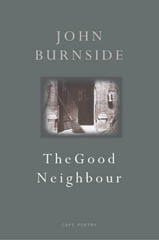 The Good Neighbour is John Burnside’s ninth collection. In 2000 Burnside won the Whitbread Poetry Award and was shortlisted for both the Forward and the T.S. Eliot Prizes. This number of volumes of poetry and these distinctions now qualify him as a mature poet, despite his years. Burnside is a poet’s poet: judging from the epigrams that he uses to introduce his poems, his artistic and intellectual affinities are with the work of such illuminati as Frost, Stevens, Baudrillard, Bukowski, Thoreau and Keats, leaving us in no doubt that Burnside’s own poems are very much part of that tradition. Rigorous and well-made, they are contemplative, questioning, exploratory pieces. Though not aridly intellectual, they are not easy and require no little effort on the part of the reader. Thankfully, perhaps, the collection’s title-poem eases the reader in. ‘The Good Neighbour’ is a kind of song of his other self, where Burnside meets his ‘ghost companion … that phantom in the sleet,/fifth in a party of four, he’s not quite there,/but not quite inexistent, nonetheless.’
The Good Neighbour is John Burnside’s ninth collection. In 2000 Burnside won the Whitbread Poetry Award and was shortlisted for both the Forward and the T.S. Eliot Prizes. This number of volumes of poetry and these distinctions now qualify him as a mature poet, despite his years. Burnside is a poet’s poet: judging from the epigrams that he uses to introduce his poems, his artistic and intellectual affinities are with the work of such illuminati as Frost, Stevens, Baudrillard, Bukowski, Thoreau and Keats, leaving us in no doubt that Burnside’s own poems are very much part of that tradition. Rigorous and well-made, they are contemplative, questioning, exploratory pieces. Though not aridly intellectual, they are not easy and require no little effort on the part of the reader. Thankfully, perhaps, the collection’s title-poem eases the reader in. ‘The Good Neighbour’ is a kind of song of his other self, where Burnside meets his ‘ghost companion … that phantom in the sleet,/fifth in a party of four, he’s not quite there,/but not quite inexistent, nonetheless.’
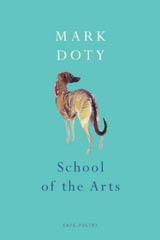 The only American poet to have won the T.S.Eliot Prize, Mark Doty, like Burnside, is a distinguished and much respected writer. This, School of the Arts, his seventh collection, is itself, like all his poetry, ‘a brace against time.’ Here Doty’s main concerns seem to be with time; past, present and future. The future is best explored in his five ‘Heaven’ poems, meditations of sorts on what Heaven signifies to three friends and Doty’s current two dogs, though all very much mediated by Doty himself. ‘Heaven for Helen’ is the most traditional and most obviously Judaeo-Christian inspired concept of an afterlife. His painter friend Helen is evidently a person of faith; not so Doty, who reveals his own anxieties about the workability of an afterlife, which for him, he decides, ‘won’t be easy to love.’ Helen, he thinks, ‘will master it, though I may not./ She has practised a long time learning to see…/Perhaps that’s why she’s a painter,/…to practise disappearing/into her scrupulous attention,/an exacting rehearsal for the larger/world of things.’ With this implied acceptance of his own limitations, ‘I should have kept my eyes on the ground’, Doty seems to acknowledge Helen as the completer artist, ‘il miglior fabbro’. Doty’s work of recent years has of course been greatly characterised by its directness and by the apparent simplicity and unfussiness and almost spareness of style that communicates his singularity of vision and his original voice. These qualities are no more evident than in his School of the Arts.
The only American poet to have won the T.S.Eliot Prize, Mark Doty, like Burnside, is a distinguished and much respected writer. This, School of the Arts, his seventh collection, is itself, like all his poetry, ‘a brace against time.’ Here Doty’s main concerns seem to be with time; past, present and future. The future is best explored in his five ‘Heaven’ poems, meditations of sorts on what Heaven signifies to three friends and Doty’s current two dogs, though all very much mediated by Doty himself. ‘Heaven for Helen’ is the most traditional and most obviously Judaeo-Christian inspired concept of an afterlife. His painter friend Helen is evidently a person of faith; not so Doty, who reveals his own anxieties about the workability of an afterlife, which for him, he decides, ‘won’t be easy to love.’ Helen, he thinks, ‘will master it, though I may not./ She has practised a long time learning to see…/Perhaps that’s why she’s a painter,/…to practise disappearing/into her scrupulous attention,/an exacting rehearsal for the larger/world of things.’ With this implied acceptance of his own limitations, ‘I should have kept my eyes on the ground’, Doty seems to acknowledge Helen as the completer artist, ‘il miglior fabbro’. Doty’s work of recent years has of course been greatly characterised by its directness and by the apparent simplicity and unfussiness and almost spareness of style that communicates his singularity of vision and his original voice. These qualities are no more evident than in his School of the Arts.
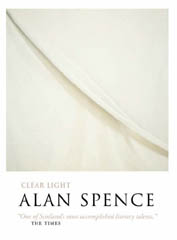 Alan Spence is the Scottish master of the haiku, the Japanese lyric form – normally seventeen syllables, three lines, 5/7/5 – in which ‘epics are shrunk to epigrams.’ His Clear Light offers an observation for every occasion, or nearly ever occasion, and one for all seasons. To read a collection of haiku from cover to cover in one sitting is hard-going: paradoxically, the apparently simple intensity of each piece as a single work seems to diminish in the attempt, as all risk conflating into one massive poem. So I found the only way to enjoy and to get something from this collection of 150 haiku was to read them a dozen at a time. It certainly paid off. Like the late Alexander Scott’s ‘Scotched’ – two-liners about Scottish culture, life and art which appeared over several years in different literary journals and contained nuggets of wry wisdom – Spence’s jewel-like haiku are best savoured in short snatches. Out of several dozen wee beauties I could quote to illustrate Spence’s mastery of the form, I will satisfy myself with two: in ‘secondhand bookshop’ Spence, with no apparent self-pity, faces up with wise resignation to the fate of all authors, ‘secondhand bookshop -/my own books/musty as the rest.’ His winter haiku sequence is breathtaking, like the air on a piercingly sharp winter’s day. The title-poem ends the collection, bringing us safe to haven, ‘this bright morning/glass buddha/in the clear light.’
Alan Spence is the Scottish master of the haiku, the Japanese lyric form – normally seventeen syllables, three lines, 5/7/5 – in which ‘epics are shrunk to epigrams.’ His Clear Light offers an observation for every occasion, or nearly ever occasion, and one for all seasons. To read a collection of haiku from cover to cover in one sitting is hard-going: paradoxically, the apparently simple intensity of each piece as a single work seems to diminish in the attempt, as all risk conflating into one massive poem. So I found the only way to enjoy and to get something from this collection of 150 haiku was to read them a dozen at a time. It certainly paid off. Like the late Alexander Scott’s ‘Scotched’ – two-liners about Scottish culture, life and art which appeared over several years in different literary journals and contained nuggets of wry wisdom – Spence’s jewel-like haiku are best savoured in short snatches. Out of several dozen wee beauties I could quote to illustrate Spence’s mastery of the form, I will satisfy myself with two: in ‘secondhand bookshop’ Spence, with no apparent self-pity, faces up with wise resignation to the fate of all authors, ‘secondhand bookshop -/my own books/musty as the rest.’ His winter haiku sequence is breathtaking, like the air on a piercingly sharp winter’s day. The title-poem ends the collection, bringing us safe to haven, ‘this bright morning/glass buddha/in the clear light.’
Paula Jennings, singing lucifer, Onlywomen Press 0906500664 £7.99; Fras, Atholl Browse Bookshop by The Station, Blair Atholl, Perthshire, Scotland PH18 5SG, £4; Alison Brackenbury, Bricks and Ballads, Carcanet 1857547519 £7.95; John Burnside, The Good Neighbour, Cape Poetry 0224075179 £9.00; Mark Doty, School of the Arts, Cape Poetry 0224075187 £9.00; Alan Spence, Clear Light, Canongate 1841956643 £7.99
© Michael Lister 2005

Comments